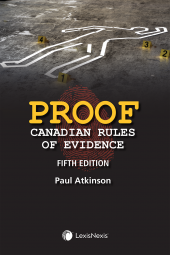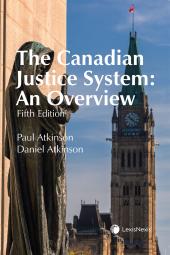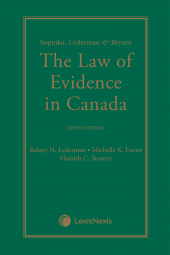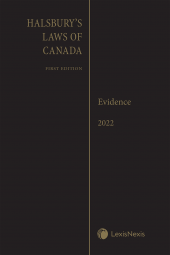Proof – Canadian Rules of Evidence, 5th Edition
This book, specifically written for non-lawyers working in the justice system and students pursuing a law-related career, explains the rules and principles of evidence, and analyzes the interaction between statutes and case reports that determine our evidence laws.
One Year Subscription Only Terms
Subscribers receive the product(s) listed on the Order Form and any Updates made available during the annual subscription period. Shipping and handling fees are not included in the annual price.
Subscribers are advised of the number of Updates that were made to the particular publication the prior year. The number of Updates may vary due to developments in the law and other publishing issues, but subscribers may use this as a rough estimate of future shipments. Subscribers may call Customer Support at 800-833-9844 for additional information.
Subscribers may cancel this subscription by: calling Customer Support at 800-833-9844; emailing customer.support@lexisnexis.com; or returning the invoice marked 'CANCEL'.
If subscribers cancel within 30 days after the product is ordered or received and return the product at their expense, then they will receive a full credit of the price for the annual subscription.
If subscribers cancel between 31 and 60 days after the invoice date and return the product at their expense, then they will receive a 5/6th credit of the price for the annual subscription. No credit will be given for cancellations more than 60 days after the invoice date. To receive any credit, subscriber must return all product(s) shipped during the year at their expense within the applicable cancellation period listed above.
Détails des produits
A readable text summarizing key aspects of Canadian Rules of Evidence
Evidence law can be complex and daunting for those being introduced to the subject for the first time, as well as for those who navigate and apply the rules in practice. Proof – Canadian Rules of Evidence, 5th Edition, specifically written for non-lawyers working in the justice system and students pursuing a law-related career, explains the rules and principles of evidence, and analyzes the interaction between statutes and case reports that determine our evidence laws. This text also includes self-test questions to assist the reader in assessing their understanding and knowledge of evidence principles.
This fifth edition contains the most recent provincial Court of Appeal and Supreme Court of Canada cases on rulings relating to the use of evidence. This text explains search and seizure rules, exceptions to the hearsay rule, similar fact evidence, and the admissibility of evidence obtained by warrantless searches.
Features
- Helps in determining what kinds of evidence are admissible; how evidence should be gathered and organized; and understanding rules on search and seizure
- Analyses and discusses seminal court cases in regards to evidentiary rulings
- Provides a succinct overview of the Canadian justice system
- Explains the sources of the rules of evidence, and analyses the interaction between statutes and case reports that determine the rules of evidence
- Refers to the latest Charter cases, and decisions addressing character evidence, informer privilege and hearsay, and the criteria for holding separate trials for multiple charges
- Includes self-test questions after each chapter to assist students in assessing their level of understanding and knowledge of evidence principles
- Contains a glossary of terms featuring key phrases
What’s New In This Edition
- The most recent provincial Court of Appeal and Supreme Court of Canada cases on rulings relating to evidence
- Content on cyber law
- Issues related to the COVID-19 pandemic, including video testimony
- Seminal Charter cases
Who Should Read This Book?
- Lawyers, law students and paralegals – a practical and well-organized evidence law book for quickly refreshing your memory on important rules of evidence
- Students preparing for a law-related career – written in plain language, the book takes a complex subject matter such as evidence law, and makes it comprehensible for non-lawyers and non-law students
- Evidence instructors and teachers – the book's structure follows a 15-week semester, and serves as an ideal textbook for any university or college course covering evidence law
- Law libraries – a valuable addition to a collection of reference material on evidence law
Table des matières
Introduction
Chapter 1: The Canadian Justice System and the Most Basic Evidence Concepts
Chapter 2: Evidence Statutes
Chapter 3: Court Cases You’ll Need to Know
Chapter 4: Witnesses
Chapter 5: Opinion Evidence and Experts
Chapter 6: Character and Similar Fact Evidence
Chapter 7: Hearsay
Chapter 8: Admissions, Confessions and Charter Protections Against Self-Incrimination
Chapter 9: Search and Seizure and Section 8 of the Charter
Chapter 10: Other Charter Rights and Remedies
Chapter 11: Gathering and Organizing Evidence
Chapter 12: Some Parting Tips For Investigators, Advocates and Witnesses
Appendix 1: Key Portions of the Canada Evidence Act R.S.C. 1985, C. C-5 (Sections 1-24)
Appendix 2: Excerpts From the Canadian Charter of Rights and Freedoms
Appendix 3: Case Report Samples
Appendix 4: Glossary of Terms
Index
 Lexis Nexis
Lexis Nexis 



